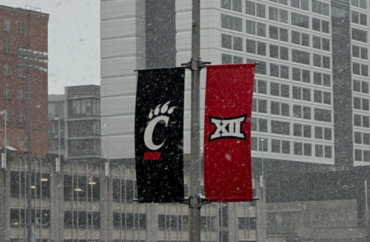
ANALYSIS: One professor says free debate is flowing, but another professor disagrees
There is a strong Democratic tilt among professors in 15 departments at the University of Cincinnati, according to a College Fix analysis.
Seven of the 15 departments surveyed lack even one identifiable Republican professor.
The Fix looked at professors’ political party affiliations using publicly accessible voter registration data from Hamilton County. The Fix identified the political affiliations of 141 out of 317 professors. The county voted 57 percent for Vice President Kamala Harris in the last presidential election.
Of those 141 identified professors, only 21 are either registered Republicans or have a record of voting mainly in GOP primaries. The other 120 professors identified are either registered Democrats or have a record of voting primarily Democrat.
The Fix cross-referenced against public information, such as curriculum vitae and research papers, to match names with registrations. Other information, including estimated birth year, was matched against birthday data included in the election statistics. The Fix only looked at professors, not lecturers, adjuncts, or emeriti faculty.
The anthropology, journalism, Judaic studies, philosophy, psychology, sociology, as well as the gender studies department do not appear to have any Republicans teaching their students, according to public data. This means seven of the 15 departments The Fix examined, almost half, seem to lack a Republican professor.
Only one leader of a department without a Republican responded to a request for comment.
Jeffrey Blevins, interim head of the journalism department, responded to questions regarding his opinion on the number of Democrats in his department by saying “to be honest, I have never really thought about the political affiliation of any of my colleagues.”
With regard to efforts to boost intellectual diversity at the college Blevins says “my sense is that it would be inappropriate to inquire about a candidate’s political affiliation in the hiring process. They should be hired specifically based on their qualifications for the position.”
Blevins says that political affiliation has very few implications on the values of the person or the professor, using himself as an example: “If you googled my name, an Ohio resident’s database would show my party affiliation as ‘Democrat.’”
But he contrasts this political affiliation with his identity as “a practicing Catholic, and a member of the Knights of Columbus” who has “served as the faculty adviser for the Society of St. Paul” a student organization currently “known as Catholic Bearcats.”
Blevins is “also a U.S. Army veteran, a member of the VFW, and a highly active member of the American Legion.” He serves on the “University of Cincinnati’s Veterans Task Force and [has] facilitated improvements to UC’s veterans lounge through the support of [his] local American Legion Post 484 in Cincinnati.
“Furthermore, I have a concealed carry permit holder in the state of Ohio, a gun owner, and proudly support 2nd Amendment rights,” he said. “Towards this end I participated in the 2A Summit in Cincinnati in 2023, which was sponsored by Students for Liberty (a conservative student organization, as I’m sure you’re aware). Additionally, I’ve supported UC’s student gun club.”
Ultimately, Blevins says he is a mix “of both progressive and conservative values (as well as others), and a single data point of party affiliation does not accurately (let alone fully) describe who I am or what I represent.”
When asked to clarify if this diversity of political values is reflected in his voting pattern, Blevins says he has voted for Republican candidates before: “I vote for the person not the party and that includes” both parties.
Republican professor says ‘everyone must toe the line’
The College Fix also reached out to all 21 of the professors listed as Republican in the voter registration data. Two professors confirmed they are registered Republicans.
One of those professors said that the same sort of left-leaning bias found among college professors is also present in the media. “One artifact of being in such a liberal work environment is that there can be no debate or rational discussion about certain topics, like the environment and climate change,” one professor, who asked to remain anonymous, told The Fix. “Everyone must toe the line that climate change is real, caused by humans, and demands large funding and extensive regulation to combat.”
The professor says “this attitude is ironic in a university, which is supposed to be a place of critical investigation and a free exchange of ideas.”
Moreover, an emphasis on political correctness at the university, “which started out as a good idea, has been taken to such an extreme that my students say they are now unwilling to voice opinions in class in case it hurts the feelings of another student.”
One professor, who appeared to be a Republican according to voting records, responded that he is an independent but has voted Republican for the last 16 years. He commented that an, “overwhelming majority of [his] colleagues are “progressives.”
The professor said that the atmosphere at the university is politically one-sided: “Virtually all administrators list their preferred pronouns in official correspondence. The atmosphere at the university is absolutely stifling – there is zero diversity of thought, and it is assumed that everyone is in lockstep with ‘progressive’ ideology.”
Moreover, the professor said that those at the university “participating in reappointment, promotion and tenure decisions must undergo offensive DEI training per agreement between administration and AAUP. Everyone applying for a job and for federal grants is expected to provide a DEI statement.”
One professor who appeared as a Republican responded that they were independent and didn’t support either party, voting Republican in the primary because they already supported the Democratic options.
Faculty union leader said ‘free inquiry thrives’ on campus
The College Fix also reached out to Stephen Mockabee, graduate program director in the public and international affairs school, who represented the Ohio American Association of University Professors in criticizing Senate Bill 177. The bill, ultimately passed, would create “intellectual diversity” centers at Ohio universities.
“We have chosen to agree to disagree with the sponsors of the bill over the need for new institutes to create and facilitate ‘intellectual diversity’ at our public colleges and universities,” Mockabee said at the time. “Ohio’s institutions of higher education are already open marketplaces of ideas where free inquiry is ongoing.”
Mockabee responded to a January 2 email by saying that he stands by his earlier statements regarding the integrity of Ohio’s Universities: “I continue to believe that Ohio’s public universities are places where free inquiry thrives. The party registration of a small number of UC faculty that may or may not be representative of any larger group is no reason to change this view.”
He said party registration has no effect on the way that individuals fulfill their job requirements: “Does one need to check party registration of police officers or firefighters before calling for assistance? Should patients start asking for the party registration of doctors when they make an appointment or visit the hospital?”
Mockabee also gave some clarifications on his statements representing the Ohio AAUP.
“As I indicated at the time, the testimony the Ohio Conference AAUP provided was interested party testimony, not opponent testimony,” he said. “We welcome investment in Ohio’s public higher education system, but we have serious concerns about how the legislation created entities that do not have to follow university shared governance systems that are in place to safeguard the quality of education provided to our students and to protect the academic freedom of faculty and students.”
The number of Democrats and Republicans at the University of Cincinnati is a result of self-selection, according to Mockabee: “People gravitate to studying topics that they are interested in and that fit with their values.”
Mockabee says intellectual diversity at a state university does matter: “I think students deserve a high-quality education, and part of that is being exposed to a range of ideas.”
However, “the primary factor making students hesitant to speak up about their own political views is the threat from peers, not from faculty,” Mockabee says.
He clarified that there is a need for the enforcement of justice in the classroom, but it should come from the university administration, not the government: “all students deserve to be treated fairly. But it is important to underscore that faculty who misbehave can and do receive discipline under the current system. We do not need the state legislature to micro-manage this and impose unfunded mandates.”
Chance Layton, director of communications for the National Association of Scholars, said in an email with The Fix that the ratio of Republicans and Democrats at the University is within the range of previous studies done by the NAS.
In response to a question about the reason for professors and employees at institutions of higher education to resist initiatives for intellectual diversity such Senate Bill 177, Layton said: “Intellectual diversity requires a culture of intellectual rigor, civility, and reciprocity, something entrenched leftists have spent decades attempting to undo. Such politically motivated professors are unlikely to give up power easily.”
But there has been a shift in recent years, Layton says that “schools across the country are attempting to found ‘freedom centers.’”
The College Fix received no response to media inquiries sent out to members of the public relations team at the University of Cincinnati in the past two weeks.
The Fix emailed the university media spokesperson on Jan.2 and the director of the media relations team on Jan. 3, leaving voicemails requesting a return call with the director and associate director of the media relations team at U. Cincinnati on Jan. 8.
Prior research with The Fix suggests that Democrats typically outnumber Republicans at public universities, even in red states.
A Fix study last year on the University of Oklahoma found that Democrats outnumber Republicans 11 to 1.
Democrats outnumber Republicans 98 to 1 at Cornell University, The Fix found in 2022.
A 2022 survey of the University of North Carolina at Chapel Hill faculty found Democrats outnumbered Republicans by a 16 to 1 ratio.
The results were less tilted at Ohio State University, where Democratic professors outnumbered Republican ones by a ratio of about 7 to 1.
Other College Fix research has shown that donations from faculty members favor Democrats. For example, 98 percent of federal donations University of Wisconsin professors went to Democrats in 2020.
The Fix has chosen not to publish its spreadsheet of specific names to protect the identity of Republican professors.
Breakdown
Anthropology:
Democrats: 7
Republicans: 0
Unknown: 3
Total: 10
Classics:
Democrats: 7
Republicans: 1
Unknown: 9
Total: 17
Communication, Film, and Media Studies:
Democrats: 9
Republicans: 3
Unknown: 20
Total: 32
Economics:
Democrats: 2
Republicans: 4
Unknown: 8
Total: 14
English:
Democrats: 20
Republicans: 1
Unknown: 24
Total: 45
History:
Democrats: 14
Republicans: 2
Unknown: 4
Total: 20
Journalism:
Democrats: 3
Republicans: 0
Unknown: 3
Total: 6
Judaic Studies:
Democrats: 3
Republicans: 0
Unknown: 2
Total: 5
Mathematical Sciences:
Democrats: 14
Republicans: 2
Unknown: 47
Total: 63
Philosophy:
Democrats: 7
Republicans: 0
Unknown: 1
Total: 8
Physics:
Democrats: 7
Republicans: 5
Unknown: 12
Total: 24
Psychology:
Democrats: 11
Republicans: 0
Unknown: 25
Total: 36
Public and International Affairs:
Democrats: 6
Republicans: 3
Unknown: 13
Total: 22
Sociology:
Democrats: 7
Republicans: 0
Unknown: 2
Total: 9
Women’s, Gender, and Sexuality Studies:
Democrats: 4
Republicans: 0
Unknown: 2
Total: 6
MORE: Fauci holds several ‘professor’ titles at Georgetown, but never teaches
IMAGE: University of Cincinnati/Facebook
Like The College Fix on Facebook / Follow us on Twitter






Please join the conversation about our stories on Facebook, Twitter, Instagram, Reddit, MeWe, Rumble, Gab, Minds and Gettr.